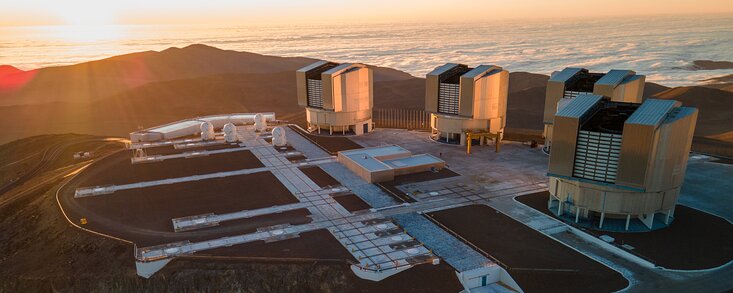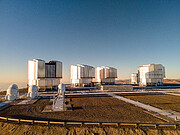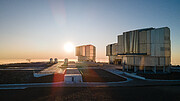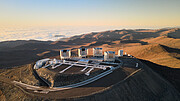Announcement
25 Years of Fantastic Science and Engineering with ESO’s Very Large Telescope
25 May 2023
ESO’s Very Large Telescope (VLT), one of the world’s most advanced optical telescopes, celebrates its 25th anniversary today. Over the last two and a half decades, from its home in Chile’s Atacama Desert, the VLT has made a profound impact on our understanding of the Universe, with several remarkable firsts.
ESO’s VLT is the flagship facility for European ground-based optical astronomy. It consists of four Unit Telescopes with main mirrors 8.2 metres in diameter and four movable 1.8-metre Auxiliary Telescopes that form part of the VLT Interferometer. On 25 May 1998, the Unit Telescope UT1 (Antu) obtained its first images, starting a new era for astronomy.
Since then, astronomers have produced over 10 000 scientific papers using data collected by VLT telescopes, an average of more than one peer-reviewed paper per day. Some of the key research done with the help of the VLT includes studying the supermassive black hole at the centre of the Milky Way and establishing the accelerated expansion of the Universe, both of which resulted in Nobel Prizes. Other key findings include the first direct image of a planet outside our Solar System and the characterisation of the first visible counterpart to a gravitational wave source.
The VLT’s remarkable contributions to science were made possible thanks to its suite of advanced instruments. One of the most versatile and demanded by the astronomical community is the FOcal Reducer and low dispersion Spectrograph (FORS), which can take images of relatively large areas of the sky with very high sensitivity. FORS has in fact taken some of the most iconic astronomical images with the VLT. Another versatile instrument is the Multi Unit Spectroscopic Explorer (MUSE), a powerful spectrograph that allows astronomers to create 3D views of the Universe. The VLT also hosts X-shooter, which can be used to observe a wide range of astronomical objects from the more faint to the very bright ones. GRAVITY, an instrument of the VLT Interferometer, is also particularly unique as it combines the light from four telescopes together and stabilises it, allowing astronomers to pick up minute details in very faint objects.
In addition to its multifaceted instruments, the VLT includes an advanced adaptive optics system to correct for the blurring caused by atmospheric turbulence. Its four-laser system, installed on Unit Telescope 4 (Yepun) and used to excite sodium atoms in the atmosphere, is perhaps the most visible feature of the VLT’s Adaptive Optics Facility. The atoms excited by the lasers emit light that is affected by the atmosphere in the same way as the light emitted by real stars. The emitted light is collected by the telescope and can be used by the adaptive-optics system to measure the distortions introduced by the atmosphere and then to correct for them. This advanced system, combined with the excellent dark-sky conditions of the Atacama Desert, ensure the telescope can obtain extremely sharp images.
Still very much at the forefront of science and engineering, the VLT is expected to continue making key discoveries for years to come. One ongoing improvement is the implementation of a laser guide star on each of the Unit Telescopes 1-3, as part of upgrades to the GRAVITY instrument.
ESO will be celebrating the VLT in its social media channels this week, and stay tuned for ESO’s new Chasing Starlight YouTube show, which will highlight some of the VLT’s top science results in its first episode.
Edit (25 May 2023, 14:00): The first episode of Chasing Starlight dedicated to the VLT is out now.
Links
Contacts
Bárbara Ferreira
ESO Media Manager
Garching bei München, Germany
Tel: +49 89 3200 6670
Email: press@eso.org
About the Announcement
| Id: | ann23009 |








